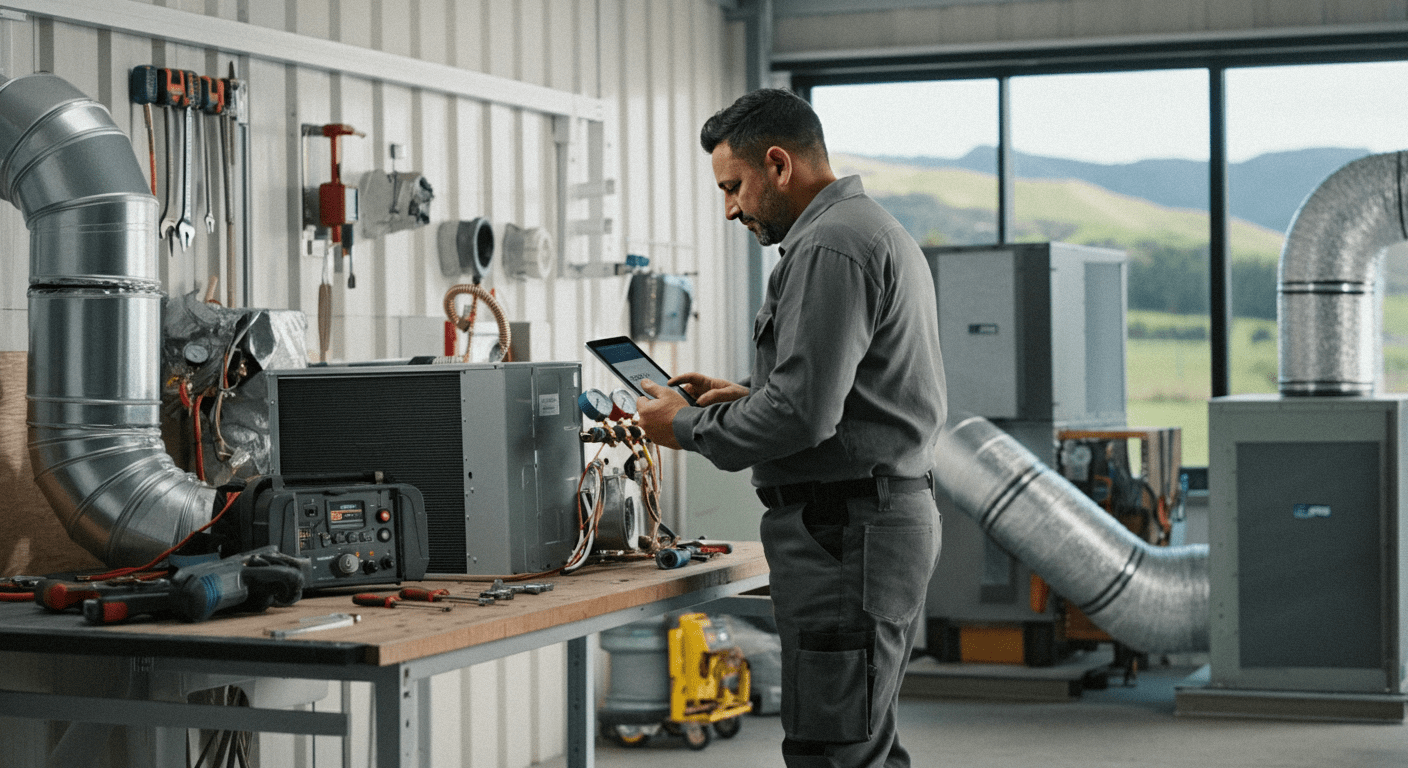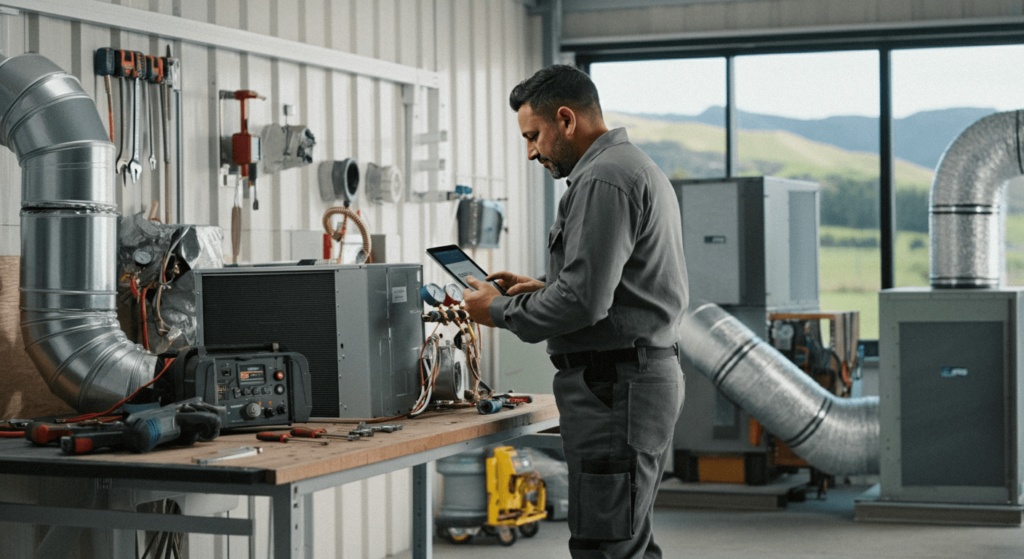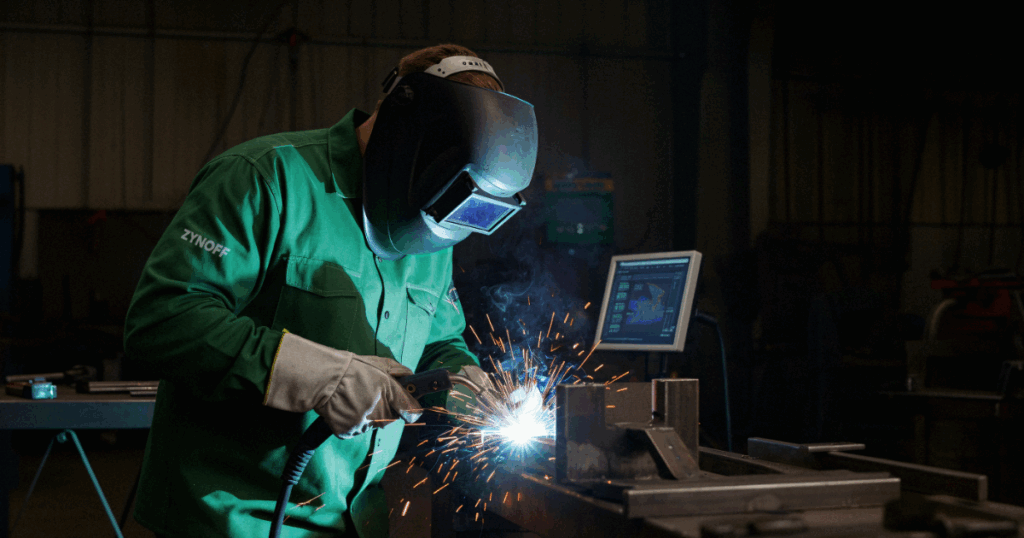Heating, ventilation, and air conditioning (HVAC) technicians maintain residential, commercial, and industrial establishments by ensuring indoor comfort and air quality. At all points during system installation, the HVAC specialists maintain responsibility and deliver maintenance solutions and repair services for air conditioners, furnaces, and ventilation units. Developing energy-efficient climate control solutions within the HVAC industry leads to growth that offers promising salaries and different professional positions throughout the United States. The complete guide examines HVAC technician work profiles alongside their expertise development and future compensation projections for 2025 to assist people interested in this ever-changing field.
Salary Overview
As of May 2023, the median annual wage for HVAC technicians in the U.S. was $57,300, which translates to an hourly rate of $27.55. However, salaries vary significantly based on experience level, location, and job role.
HVAC Pay Rates by Experience Level (National Averages for 2025)
- Entry-Level (<2 years): $52,300 per year ($25.14/hour)
- Intermediate (2–4 years): $63,500 per year ($30.53/hour)
- Senior (4–7 years): $74,500 per year ($35.82/hour)
- Supervisor (>7 years): $87,700 per year ($42.16/hour).
HVAC Salaries by City and State
HVAC pay rates vary widely across locations due to the cost of living and demand for skilled labor. Below is a table summarizing entry-level salaries in select cities and states:
Location Average Annual Salary
| Location | Average Annual Salary |
| Alabama | $48,000 – $49,400 |
| Alaska | $63,000 – $75,660 |
| California | $60,000 – $69,200 |
| Florida | $46,000 – $61,200 |
| New York | $59,000- $66,700 |
| Texas | $51,000 – $63,100 |
Top-Paying Metropolitan Areas
Some metropolitan areas offer significantly higher wages:
- Fairbanks, AK: Average annual salary of $91,840
- Napa, CA: Annual average salary of $82,650
- San Francisco-Oakland-Hayward, CA: Annual average salary of $76,180.
Key Skills That Influence HVAC Technician Salaries
- Problem-Solving Abilities: The capability to solve problems effectively and innovative solutions to complex challenges results in professional growth, leading to higher earnings.
- Customer Service Skills: Outstanding communication skills and interpersonal abilities enable technicians to establish strong client relationships, which in turn leads to improved earning potential.
- Time Management: Multiple project management skills are essential for technicians because they prepare them for progressive senior roles.
- Specialization: A technician who specializes in particular sectors, such as energy efficiency or refrigeration, will have improved earning potential. Technicians’ professional certifications make them eligible for superior wages in the market.
- Formal Education and Certifications: Completing an HVAC technology program at an educational institution and gaining recognized HVAC certifications (e.g., NATE, EPA 608) can significantly improve salary prospects.
- Experience Level: The duration spent in the field determines technician value for employers, so experienced professionals receive higher pay.
- Geographic Location: The salaries of HVAC technicians depend heavily on which geographical region they work in because different areas have varying HVAC technician market demands. Locations with strong HVAC demand tend to pay their technicians better compensation.
What HVAC Technicians Do
Installation:
- Execute heating and cooling system installations in different facilities.
- Interpret blueprints and connect systems to fuel and water supply lines.
Maintenance:
- Perform routine maintenance for system efficiency and safety.
- Performance testing procedures should accompany routine duct cleaning and equipment filtering.
Repair:
- Diagnoses and troubleshoot system malfunctions.
- The process consists of detecting irregularities while fixing these defects accordingly.
Refrigerant Management:
- Regular checks of refrigerant quantities and the topping up of the system must take place according to need.
- Ensure the refrigerant cycle functions correctly.
Energy Efficiency Upgrades:
- The installation of energy-efficient controls, including smart thermostats, should be performed.
- Duct sealing interventions to enhance system performance.
Customer Interaction:
- The HVAC specialist needs to discuss system requirements and proposed solutions with clients.
- Explain to customers the steps involved in maintaining equipment and system update procedures.
Record Keeping:
- Maintain accurate records of maintenance and repairs.
- The service record must be tracked, and regulatory requirements must be constantly monitored.
Career Path and Training
- Complete High School: Students should earn their high school diploma with math and physics classes as required subjects, among other subjects.
- Enroll in an HVAC Training Program: Students should join vocational school programs or community college HVAC training, which delivers certificates or associate degrees through programs lasting 6-24 months.
- Gain Hands-On Experience: Students should join practical training labs and simulations to develop essential HVAC skills.
- Complete an Apprenticeship: Training as an apprentice under a licensed HVAC professional delivers hands-on experience and salary compensation.
- Obtain Required Certifications: Prepare for and pass relevant certifications, such as EPA Section 608 and NATE, which are often necessary for employment.
- Acquire State Licensure: Depending on the state, obtain a license by meeting experience requirements and passing an exam.
- Continuing Education: State authorization consists of surpassing experience requirements and passing an exam when applying for licensure.
Apprentice HVAC Wages
As of 28 February 2025, the average hourly wage for a Commercial HVAC Apprentice in the United States is approximately $19.27 to $24 per hour.
Experienced apprentices can earn up to $43,000 annually or about $21 per hour at the 90th percentile. These figures suggest an average annual salary ranging from $37,451 to $40,268 for HVAC apprentices.
What Do HVAC Apprentices Do
- Assist Installation: Help senior technicians install HVAC systems, including ductwork and refrigerant piping.
- Maintenance and Repair: Perform routine maintenance tasks and assist in repairing HVAC equipment, such as air handlers and heat pumps.
- Troubleshooting: Learn to diagnose HVAC system problems and make necessary repairs under supervision.
- Safety Compliance: Adhere to safety regulations and company policies while working on job sites.
- Hands-On Training: Participate in on-the-job training and classroom education to develop skills.
The HVAC field’s modern growth occurs because customers require modern energy-efficient systems for climate control systems. Employment is projected to grow faster than the average for all occupations.
The HVAC industry provides promising advancement opportunities, along with rising demand for skilled workers and profitable compensation rates. The level of earnings for HVAC professionals grows with their gained experience and specialization and their location choice within the industry. HVAC technicians must complete formal training, obtain hands-on experience, and achieve certifications to improve their career potential. With its steady growth and emphasis on energy efficiency, the HVAC sector remains a cornerstone of modern infrastructure, offering dedicated professionals financial rewards and job security.




